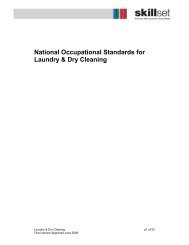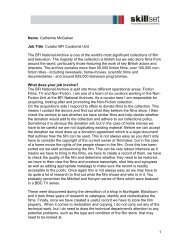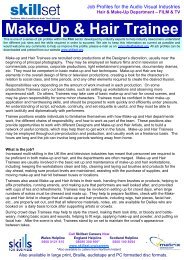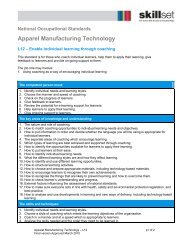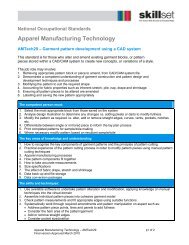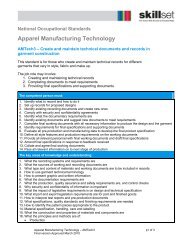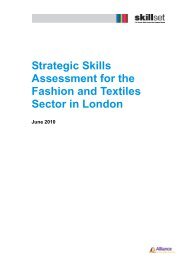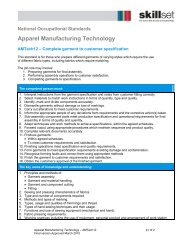Publishing in the Knowledge Economy - DTI Home Page
Publishing in the Knowledge Economy - DTI Home Page
Publishing in the Knowledge Economy - DTI Home Page
You also want an ePaper? Increase the reach of your titles
YUMPU automatically turns print PDFs into web optimized ePapers that Google loves.
<strong>Publish<strong>in</strong>g</strong> <strong>in</strong> <strong>the</strong> knowledge economy<br />
Issues for competitiveness<br />
15.4.1 Strengths and opportunities<br />
The publish<strong>in</strong>g <strong>in</strong>dustry has been highly<br />
attractive to graduates and school-leavers for<br />
some time. This trend cont<strong>in</strong>ues and it offers an<br />
opportunity for publishers to recruit bright young<br />
people. In fact, <strong>the</strong> education level of people<br />
work<strong>in</strong>g <strong>in</strong> publish<strong>in</strong>g is well above average<br />
(see Table 15.2).<br />
The dynamic and fashionable nature of <strong>the</strong><br />
bus<strong>in</strong>ess attracts many people to <strong>the</strong> <strong>in</strong>dustry.<br />
Indeed, <strong>in</strong> <strong>the</strong> early part of a person’s career<br />
<strong>the</strong> concentration of <strong>the</strong> <strong>in</strong>dustry <strong>in</strong> London is<br />
<strong>in</strong> itself an attraction. This provides <strong>the</strong> <strong>in</strong>dustry<br />
with a highly qualified, relatively low cost<br />
employee base.<br />
15.4.2 Challenges<br />
Most of <strong>the</strong> challenges concern<strong>in</strong>g staff<strong>in</strong>g are<br />
centred on two areas. First, <strong>the</strong>re are issues<br />
relat<strong>in</strong>g to hav<strong>in</strong>g a London and South Eastdom<strong>in</strong>ated,<br />
young employee base with a high<br />
proportion of female staff. Second, <strong>the</strong>re is <strong>the</strong><br />
<strong>in</strong>creas<strong>in</strong>g importance of deploy<strong>in</strong>g new<br />
technology <strong>in</strong> both bus<strong>in</strong>ess support and as<br />
part of products. This is reflected <strong>in</strong> <strong>the</strong><br />
responses to <strong>the</strong> effect of skills and staff<br />
constra<strong>in</strong>ts on <strong>the</strong> publish<strong>in</strong>g <strong>in</strong>dustry questions<br />
<strong>in</strong> our survey as shown <strong>in</strong> Figure 15.3.<br />
There is a relatively high turnover of staff <strong>in</strong><br />
much of <strong>the</strong> <strong>in</strong>dustry. In <strong>in</strong>terviews and dur<strong>in</strong>g<br />
<strong>the</strong> focus groups, several publishers stated that<br />
attract<strong>in</strong>g graduates <strong>in</strong>to <strong>the</strong> <strong>in</strong>dustry <strong>in</strong> editorial<br />
and market<strong>in</strong>g is not a problem, but reta<strong>in</strong><strong>in</strong>g<br />
<strong>the</strong> staff is difficult. Some publishers spoke of<br />
a ‘talent gap’ <strong>in</strong> <strong>the</strong> middle level of editorial<br />
departments. Reasons stated dur<strong>in</strong>g <strong>in</strong>terviews<br />
as be<strong>in</strong>g causes of this are:<br />
“<strong>the</strong> lack of a career path”<br />
“more attractive offers from o<strong>the</strong>r <strong>in</strong>dustries”<br />
“a desire for a better quality of life”<br />
The latter reason is fur<strong>the</strong>r compounded by<br />
<strong>the</strong> <strong>in</strong>dustry hav<strong>in</strong>g a high proportion of female<br />
staff who often tend to migrate from London<br />
when <strong>the</strong>y have a family. Ris<strong>in</strong>g house prices,<br />
congested transport and <strong>the</strong> lack of affordable<br />
childcare are factors that affect all companies<br />
operat<strong>in</strong>g <strong>in</strong> London and <strong>the</strong> south east. On <strong>the</strong><br />
o<strong>the</strong>r hand, even if it were feasible, a wholesale<br />
migration of publish<strong>in</strong>g from <strong>the</strong> creative and<br />
vibrant environment offered by London would<br />
adversely affect <strong>the</strong> <strong>in</strong>dustry <strong>in</strong> terms of its<br />
ability to attract bright university graduates at<br />
<strong>the</strong> entry level. Solv<strong>in</strong>g <strong>the</strong>se issues is not go<strong>in</strong>g<br />
to be easy but some of <strong>the</strong>m can be alleviated<br />
by <strong>in</strong>dustry <strong>in</strong>itiatives, especially <strong>in</strong> relation to<br />
tra<strong>in</strong><strong>in</strong>g, career paths and flexible work<strong>in</strong>g.<br />
As <strong>the</strong> <strong>in</strong>dustry moves more and more<br />
towards <strong>the</strong> <strong>in</strong>tegration of content with<br />
technology, publishers are be<strong>in</strong>g faced with <strong>the</strong><br />
need for more technically-oriented staff. This will<br />
<strong>in</strong>volve attract<strong>in</strong>g new staff to <strong>the</strong> <strong>in</strong>dustry, but<br />
Table 15.3 <strong>Publish<strong>in</strong>g</strong> skill levels, %<br />
No, or Basic Intermediate Higher level Advanced<br />
low level e.g. O levels e.g. A levels e.g. degree qualifications<br />
qualifications<br />
e.g. postgraduate<br />
All publish<strong>in</strong>g<br />
Management 5 5 12 65 12<br />
Editorial 3 5 17 65 5<br />
Support 5 16 44 29 2<br />
Office adm<strong>in</strong> & sec. 5 32 38 19 1<br />
Production 4 25 35 30 1<br />
Sales, market<strong>in</strong>g & circulation 4 28 34 27 1<br />
Advertis<strong>in</strong>g 3 52 23 16 1<br />
O<strong>the</strong>r 53 10 12 19 0<br />
Source <strong>Publish<strong>in</strong>g</strong> NTO<br />
94



